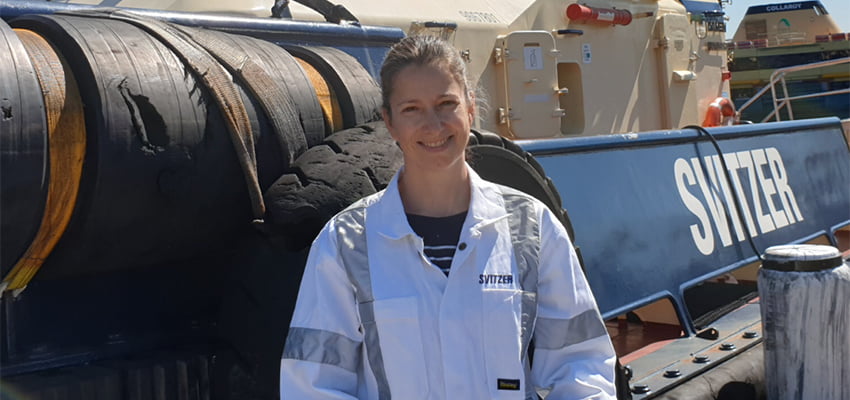MEL’S first introduction to maritime was a 10-day family voyage on the Bounty (a replica of Captain Bligh’s famous ship of the same name) in 1988. She was just 13 but that trip taught her that boats could be fun, with many opportunities for adventure. When she couldn’t secure work in her field of study after university, she instead chased adventure in the Kimberley Islands as a deckhand on a pearling boat. She found she quite liked the manual labour and team work it required. She continued to pursue jobs on boats and eventually gained a cadetship with Teekay Shipping in 2003.
Rewarding roles
Mel found being an engineer on foreign-going vessels satisfying and rewarding as it sometimes required her to engage her analytical and problem-solving skills. She could even get creative, constantly learning from others, using her skills, needing to be self-reliant yet able to work in a team. Every day presented new and different challenges, with an option to visit exotic countries.
Mel started as chief engineer with Svitzer in 2015 and is responsible for the maintenance and repair of the marine systems and equipment on-board the tug. She is also responsible for various activities, including bunkering and assisting with deck and winch operations during towage operations.
Although the work is rewarding, the long and odd hours of work can be challenging at times. But she has the benefit that she can run her own game in a sense and plan maintenance work for the week according to her schedule.
One of the benefits is working the sunrises on Sydney Harbour. There is the magical scenery of the harbour and, of course, she gets to go home at the end of each shift.
Challenges for women
One of the main challenges is seeing a career path that can support different phases of life – from staring out and seeking adventure, to having a family. With so few women in the industry, it is rare to come across other successful women who have achieved this. Some other challenges include:
- the uncertainty and lack of confidence entering a male-dominated workforce with few female role models;
- the difficult logistics of working away from home, for long periods of time;
- working shifts while raising a family; and
- not knowing the process to enter the maritime industry.
Improving diversity
Mel would like to see more willingness among men to share the workload of balancing family and professional life and encourage more men to take on the primary carer role at home. This requires a societal change to remove any stigma attached to those men who do choose to be primary carer.
There also need to be more female role models in the maritime industry, with improved visibility. This is why Mel is so supportive of the Nautical Institute’s Women in Maritime initiative. Shipping companies need to think about flexible working conditions and the government, she believes, should improve childcare options to support different career paths.
Promoting jobs
There also needs to be a general industry-wide promotion of maritime jobs with the aim to make maritime jobs more visible. This would improve diversity within the industry and attract women directly from school and higher education. Mel realises it can be a real challenge to reach people in the industry or those wishing to enter it. On a positive note, maritime companies are definitely starting to think outside the box. They are aware of the benefits of having a diverse workforce and are actively seeking a range of candidates.
Career advice
Mel’s final comment is to encourage young women to get involved as much as they can in the industry.
“Get a cadetship with a shipping company. Get as much experience in the meantime in the industry even if it means working for an overseas company or with a crew speaking a foreign language,” she says.
“Go ahead and organise your study for your tickets even if you haven’t been picked up for a cadetship. Get your name out there, badger shipping companies with CVs and requests for interviews.
“Don’t remain stagnant, do something to advance your skills, experience and chances for gaining work at sea. Get work on your local boats. Work hard, listen and learn from everyone around you as a career at sea is extremely rewarding.”
* Captain Patrick Walsh AFNI is the assistant secretary at South East Australia Nautical Institute
This article appeared in the October 2019 edition of DCN Magazine

